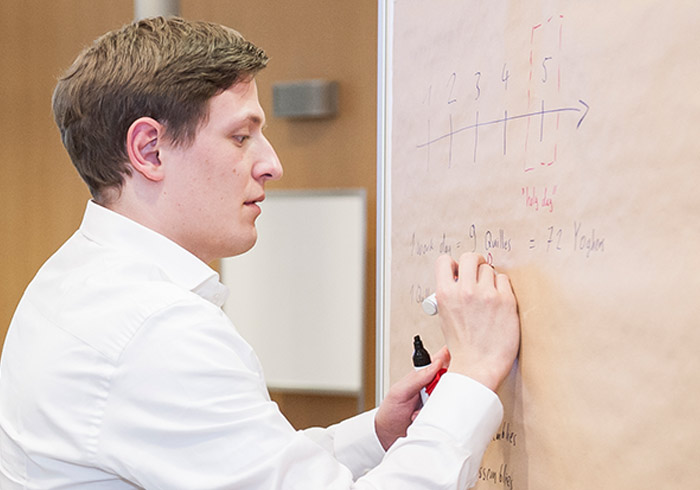Professional development as a competitive advantage: companies and staff benefit alike
The COVID-19 pandemic has been turning the principles of global trade upside down for months. It has become necessary to rethink supply chains and logistics, to win over new customers and markets, and to make sure the brightest minds are retained at the company — all at the same time. This is where HECTOR School of Engineering & Management, the Technology Business School of the Karlsruhe Institute of Technology (KIT), comes in, offering three opportunities for corporations and medium-sized businesses: firstly, the part-time Master’s programs for aspiring young managers; secondly, professional development courses over several days to prepare entire departments and teams for the future; and thirdly, longer-term industrial projects to initiate and support change processes.
The advanced training courses focus on KIT’s strategic topics — energy, mobility, and information systems — covering all facets such as digital transformation and Industry 4.0. “While the extra-occupational Master’s programs last two years, we offer the entire syllabus in a compact format,” says Nico Jäckel, Head of Sales and Marketing at HECTOR School. “One example is traditional mechanical engineering. It is currently undergoing radical change in that it has to focus on electrification and digitalization to survive on the world market,” explains Jäckel. “We provide additional training for experienced staff in three- to five-day modules. We provide additional education in close consultation with the management to allow the companies to proceed further in their change process.”
To suitably align different teams with different work focuses within the same company, HECTOR School also offers long-term and tailor-made programs. For example, it is currently offering a multi-stage professional development concept, which runs for over a year. It goes from a basic to a specialized level across the departments of a renowned engine manufacturer. The extensive, tailor-made courses range from basic courses in electrical engineering to lectures and laboratories on system development, new forms of energy, and automation for highly qualified engineers.
“Our aim is both to pass on current, technical knowledge and to strengthen the transfer of this knowledge — in other words, how the participants can use their newly gained knowledge for the company and make it part of everyday life in the company,” emphasizes Jäckel. “That is why HECTOR School teaches both technical and management expertise in its professional development modules, that is actually in current demand in the industry. This increases the rate of implementation,” he adds. HECTOR School uses this multi-layered qualification concept to answer a whole range of urgent questions from the industry: How will my company remain competitive and become fit for the future? What makes my company attractive for the best applicants and how can I retain excellent professionals and train them effectively? HECTOR School’s experienced lecturers, most of whom have been recruited from the ranks of the Karlsruhe Institute of Technology, convey different perspectives: on the one hand, profound academic knowledge and, on the other hand, groundbreaking trends from the global industrial landscape. This is because most of them have worked in a variety of companies themselves or maintain close ties with companies through joint projects. They help companies by ensuring that no questions regarding the future remain unanswered. Employees also benefit in many ways: their work gets new momentum, becomes more creative, and a higher qualification also always provides for improved career opportunities. “A classic win-win situation,” says Nico Jäckel in conclusion.
For more information, visit:


